
Bristol Grammar School INFORMATION GUIDE for joining the Sixth Form in 2025


Bristol Grammar School INFORMATION GUIDE for joining the Sixth Form in 2025
The Sixth Form is a time for fresh challenges and new friendships. Pride, determination, integrity, self-confidence, humour and social awareness form the backbone of what the BGS Sixth Form stands for, and of the personalities we strive to encourage and support.
Sixth-form education is a partnership between the school, parents and students. For it to be successful there must be a clear understanding of the nature of this interaction and willing cooperation between us all.
For the school:
• We provide an environment built on a culture of support, recognition and communication
• We deliver high-quality teaching in a positive and friendly environment, as well as providing the resources for productive independent study. Individual academic mentoring with Form Tutors will ensure students maximise their potential and nurture their skills
• We provide the guidance and expertise required to support successful post-BGS applications and the awareness to target and prepare for future careers
• We promote and encourage involvement in a wide range of co- and extracurricular activities underpinned by the values and aspirations of teamwork and leadership
• We will provide the Sixth Form Centre for students to unwind in with their peers in a relaxed, fully-inclusive, social atmosphere.
For Sixth-formers:
• Students are expected to apply themselves conscientiously to their studies, to cooperate with their teachers in the classroom, to meet the commitments placed upon them and to strive to realise their full academic potential
• Students are expected to take pride in the presentation of their work, personal appearance and the impression they give both in and outside the school
• Students are expected to commit themselves to a full range of opportunities and responsibilities beyond the classroom, building on established interests, taking up new and rewarding pursuits, and leading and inspiring younger members of the school community
• In using the Sixth Form Centre, students agree to be bound by its Conditions for Use and to do all they can to assist the smooth running of the Sixth Form
• Students must accept and adhere to the school rules and show respect for all other members of the school community in the way they conduct themselves.
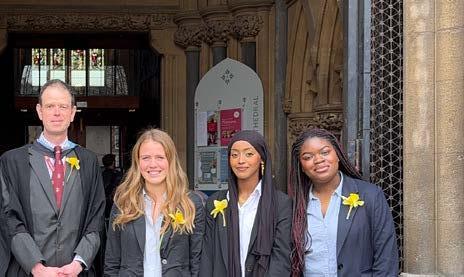
I am very glad I moved to BGS. I really like the ethics of the school and being surrounded by likeminded people. There is a real community feeling to BGS – everyone wants you to do well, and everybody is happy to help everybody else.”
Sixth Form Expectations 2
The School’s Mission and Aims 4
Director of Sixth Form’s welcome 5
Key contacts 6–7
o Addresses
o Website
o Social media
o School Reception
o BGS Helpdesk
o Sixth Form staff
o House staff
The Sixth Form 8
o Being a BGS Sixth-former
o What the Sixth Form requires from you
o What if you get it wrong
The School day 9
o The School Day
o Codes for the doors and gates
o Junior Common Room café
o The School Diary
Registration and absence 12
o Registration
o Absence procedure
o Late registration
o Leave during the day
o Games and Activities absence
Travelling to School 13
o Use of cars by Sixth-formers
o Getting to and from Failand
Care of students at BGS 14–17
o Pastoral care
o House system
o Learning Support
o School Counsellors
o Health and medical information
o Your mental health and wellbeing
Sport, activities and trips 18
o Sport
o Activities
o Trips and visits
Clubs and Peer Mentoring 19
o Clubs and societies
o Peer Mentoring
Performing Arts 20
o Music
o Dance
o Drama
o Speech and Drama lessons
Learning at BGS 22–24
o The curriculum
o Marking and assessment
o Reports to parents and Progress Overview Meetings
o Individual study
o The Library
o Rewards and sanctions
Future Pathways 25
Dress code and property 26–30
o Dress code requirements
o Games kit
o Guidance on religious dress
o Students’ property
o Valuables
o Lost Property
o Other equipment
Communication 31
o My School Portal
o Weekly email
o Website
o Letters home
o Duplicate communications
o Texting parents
o Email
BGS community 32–33
o School Events
o Prize Giving
o The School Song
o Bristol Grammar School Foundation and Old Bristolians’ Society
o Friends of BGS
Care and Welfare procedures 34–35
o Safeguarding and Child Protection
o E-safety
o Images
o Mobile phones and other personal digital devices
o Relationships and sex education
o Drugs
Finding your way around 36
o School Map and Gate Codes
First day of term
Thursday 4 September
Head’s Reception for parents of Lower-sixth students
Tuesday 9 September
The BGS Mission
To provide an exceptional and rounded education to those who might benefit from it, regardless of their background and financial means.
The BGS Values Kindness
Being kind to others and oneself, and showing compassion, support, respect, selflessness and humility.
Integrity
Being honest with others and oneself, and doing what is right, even when it is not easy.
Rigour
Striving to fulfil our immense potential, and facing difficulty with courage and resourcefulness.
BGS Aims
1. To nurture, challenge and celebrate each individual.
2. To develop an excitement for learning which goes beyond school.
3. To promote physical and mental wellbeing, and the development of good character.
4. To make a BGS education available to all those who might benefit from it.
5. To be a diverse and representative community, and one which serves Bristol and beyond.
6. To ensure that the school continues to flourish for generations to come.
Dear student,
I am sure many of you are now eager to start an exciting new chapter with the next two years in the Sixth Form, and excited about all the opportunities you can get involved with as a Sixth-former. This guide is designed to answer many of your questions on organisation, opportunities and our expectations.
A true strength of our Sixth-formers is their drive and determination to involve themselves in the diverse range of activities and clubs on offer at BGS. Sport, music, drama, dance, the Gold Duke of Edinburgh’s Award, Model United Nations, charity fundraising and volunteering for the benefit of others, are just some of the areas that our students flourish in. There are also opportunities for you to take on responsibility and leadership roles, for example, as part of the Prefect or Peer Mentor teams, or within our House system and academic departments. Our school values of Kindness, Integrity and Rigour are central to all we do.
I am delighted to welcome you and hope that I can share in your successes over the coming years. I hope you find this Information Guide helpful. Remember that my door is always open if you want to talk anything through, or if you have any thoughts on how things are going in the Sixth Form.
I would like to wish you all the very best of luck for your GCSE results; your hard work will no doubt be reflected in some pleasing results in August.
Once your papers are over, and summer break lies ahead, make sure you have a chance to relax and unwind, and spend time with family and friends.
I look forward to seeing you all in September,

Justin Harford Director of Sixth Form jharford@bgs.bristol.sch.uk

Main School site
Bristol Grammar School University Road
Bristol BS8 1SR
Tel: 0117 973 6006
Fax: 0117 946 7485
Failand sports ground
The Don Pople Pavilion
Bristol Grammar School Sports Ground Clevedon Road Failand Bristol BS8 3TL
Tel: 0127 539 4271
The website is a good source of information and news. WholeSchool information such as policies and procedures, contact details for teaching staff, term dates and details of our Friends of BGS are available on the website. www.bristolgrammarschool.co.uk
Follow us on Facebook, Twitter and Instagram (search @BGSBristol and @bgssixthform) to keep up-to-date with BGS news and events.
Our Main Reception is located just inside the main entrance doors to the Senior School. Reception is open from 8.00am to 4.30pm Monday to Friday. All visitors, including parents, should report to Reception upon arrival at the School. If you have any questions, please contact our Receptionist who will be happy to forward your call to the relevant staff member or give advice on the best person to address an email to.
Mrs Jo Abrams and Mrs Ivy Fackayan Main Reception 0117 973 6006 jabrams@bgs.bristol.sch.uk

The BGS Helpdesk is opposite the main entrance to the Senior School. It is open from 8.00am to 6.00pm during term-time. Students and parents can use it to drop off or collect anything left at home. Students should also sign in late here and sign out before leaving School for any appointments and back in upon their return.
Mrs Rosemarie Stewart
Staff email addresses are formed as follows: their first initial followed by their surname then the school’s address, for example, psmith@bgs.bristol.sch.uk
Ms Carmel Golden
Mrs Claire Watts BGS Helpdesk Administrators 0117 933 9817 bgshelpdesk@bgs.bristol.sch.uk

Mr Justin Harford Director of Sixth Form and Claire Kent Deputy Head of Sixth Form

Mr David Ruck Head of Future Pathways

Mrs Jane Hicks Sixth Form Secretary
Parratt’s House
Head of House: Miss Natalie Parratt
Deputy Head of House: Mr Steve Carruthers
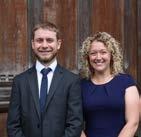
Clare’s House
Head of House: Mrs Ellice Clare
Deputy Head of House: Miss Ann Webb

Scott’s House
Head of House: Mr Ben Scott
Deputy Head of House: Miss Katie Bovey


Bramley’s House
Head of House: Mr Chris Bramley
Deputy Head of House: Miss Lucy Gladdy
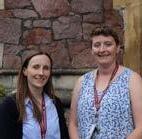
Glenn’s House
Head of House: Mrs Louise Glenn
Deputy Head of House: Miss Emma Cox

Short’s House
Head of House: Mr Andrew Short
Deputy Head of House: Mr Charlie Morris
Being a BGS Sixth-former
Over the next two years we will help equip you with the fundamental drive, tenacity and resilience needed to succeed, despite the obstacles life may put in your way. Our aim is for you to gain the skill of ‘knowing what to do when you don’t know what to do’.
Being resilient does not mean going it alone: we thrive on the companionship, counsel and trust of our peers and elders. Use this support to help you along the way, and if you get knocked down (we all do), then dust yourself down, look around you and go again ...
Your BGS Sixth Form Challenge:
• Become an expert in your passions
• Enter a competition
• Enrol on an online course: see <www.futurelearn.com>
• Attend a public lecture at the University of Bristol Festival of Ideas
• Nurture your personal and professional network: go and introduce yourself!
• Prioritise quality downtime that makes you smile :)
• Be both a leader and a supportive passenger
• Devote time to the benefit of others and reap the rewards.
What the Sixth Form requires from you Sixth Form courses represent an important stage of school life. You will need to plan your work carefully and monitor your progress. Teachers and Form Tutors will help to set achievable targets and will give regular assessment of how you are progressing towards reaching them.
You will need to spend at least four hours per subject per week in individual study beyond the classroom for A level and Pre-U.
You must not commit yourself to any paid employment during the school day, even if you have no lessons. The benefits offered by a part-time job need to be balanced against the impact it will have on your academic studies in terms of hours and the quality time and energy you can commit to them. This is especially true as you prepare for exam periods. Talk to your parents/carers about the best strategy for you to adopt.
You will have to manage your social life carefully too: socialising is encouraged, but you should balance your time wisely between work, rest and play.
If you find the early stages of the course difficult, don’t struggle on your own – ask your teachers for help. Talk to other students in the group: they may be experiencing similar feelings and you may gain encouragement from mutual support. Make sure your Form Tutor and Head of House are aware of your difficulties. Don’t give up too quickly – anything worthwhile may require some hard work and persistence to make it happen. Mr Harford and Mrs Kent’s doors are always open.
If work builds up and you can’t meet deadlines Deadlines are there to be met so you will need to plan what you have to do to meet them. Occasionally you may find that different subjects are expecting assignments to be completed at the same time, and in spite of careful planning it is difficult to meet all your commitments. If this happens you should talk to your teachers about the problem, and discuss it with your Form Tutor; try to negotiate a solution to the problem in advance.
For a small number of people it may become apparent in the first few weeks that they have made a wrong choice of subject. If you find yourself in this situation you should initially discuss your doubts with your teacher(s) and Form Tutor. All changes must eventually go through Mr Harford, who has oversight of students’ individual curricula. It is very unlikely that we will agree to changes after the Autumn Half-term break.
Monday, Wednesday and Friday
8.30am Registration and Assemblies
8.50am Period 1
9.55am Period 2
10.55am Break
11.25am Period 3
12.25pm Lunch and Clubs
1.45pm Period 5
2.50pm Period 6
3.50pm End of School
The School Day
The Sixth Form Centre opens at 7.45am.
All Sixth-formers should be in School for Registration at 8.30am, regardless of whether they have a free period as their first lesson.
There are five lessons in a school day. On Mondays, Wednesdays and Fridays Sixth-form students will have three lessons in the morning and a further two lessons in the afternoon.
On the days they have Activities (Tuesdays) or Games (Thursdays), they will have a fourth lesson in the morning, and then have lunch ahead of their afternoon sessions.
The Sixth Form Centre remains open until 5.30pm and the Library until 6.00pm every day.
Tuesday and Thursday
8.30am Registration and Assemblies
8.50am Period 1
9.55am Period 2
10.55am Break
11.25am Period 3
12.25pm Period 4
1.30pm Lunch then Activities/Games
3.50pm End of School
Junior Common Room café
Sixth-form students have a café in their Junior Common Room (JCR) in the Sixth Form Centre from which they can purchase food and drink. The café is open from 7.45am until 2.00pm.
A wide variety of hot and cold food is available daily, including cereals, sweet and savoury pastries, bacon rolls, pasta, jacket potatoes, meal deals, salads, sandwiches, fruit and much more.
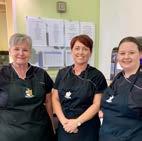
The School Diary
Term dates are published in the Parent Information area of our website.
Parents and students have electronic access to the School Diary via My School Portal; information will be sent to you in the Autumn term if you are joining us in September. Should you have any queries about the Diary, please visit our website or contact the School Office.
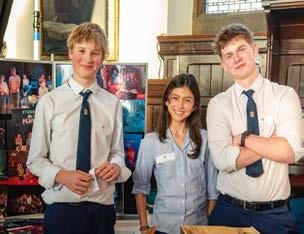
Students typically register in their form-groups in the morning at 8.30am, and at the start of Period 5 in the afternoon. All Sixth-formers should be in school for Registration at 8.30am, regardless of whether they have a free period as their first lesson.
If a student is not present for Morning Registration and we don’t have a reason noted for absence, we will send a text to the first parent’s mobile number. This text is usually sent before 10.30am, and we would appreciate a My School Portal reply to the message.
If a student is not well enough to attend school, or will be absent for any other reason, we ask parents to let us know on the first day (and each subsequent day) of the absence by emailing the BGS Helpdesk at bgshelpdesk@bgs.bristol.sch.uk copying in the Form Tutor or by by calling 0117 973 6006, before 8.30am.
If a student is going to be late for school and will miss Morning Registration, wherever possible, parents/carers must inform us that their child is safe and give an estimated time of arrival by contacting the BGS Helpdesk.
Students who arrive after 8.30am should register with Mrs Hicks, the Sixth Form Secretary, or the BGS Helpdesk.
Students should not go straight to a lesson before they have registered, no matter how late their arrival.
Three ‘lates’ in a half-term will usually lead to a detention, unless there are extenuating circumstances; such circumstances should be discussed with the Form Tutor. This sanction is intended to emphasise the importance we place on punctuality.
Parents should make every effort to ensure that appointments are made outside school hours. Where it cannot be avoided, students should attend school for as much of that day as possible. Parents must inform the school at least a day in advance of any medical or dental appointments by emailing the BGS Helpdesk.
BGS recognises that there may be times where children of different faiths observe religious festivals that fall outside of school holidays and weekends, and will allow authorised absences for these times.
To avoid disruption to teaching and learning we ask parents not to take family holidays during term-time. If this is unavoidable, parents should email the BGS Helpdesk giving as much notice as possible.
Sixth-form students may leave the school site during the day. They are expected to observe the dress requirements and School Rules when out of school. They may not engage in any activity that will bring the school into disrepute.
Missing Games or Activities in the case of illness or injury
Any student seeking to be excused from curriculum Games or Activities should ask a parent to email either Mr Parrish, Director of Sport, at tparrish@bgs.bristol.sch.uk, or Mr Nalty, Head of Activities and Enrichment, at analty@bgs.bristol.sch.uk explaining why.
If a student is taken ill or gets injured during the morning, they must see one of the School Nurses and get a written note from them. Students who forget kit, equipment or miss the coach are likely to receive a formal sanction.
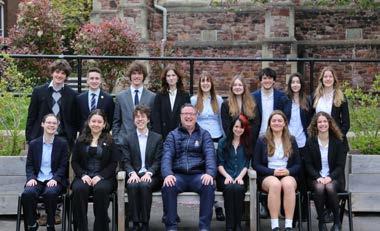
Student top tip:
“Teachers treat you much more like an adult: every relationship you make is slightly different, but they all want you to have high expectations of yourself.”
Use of cars by Sixth-formers
We are keen to promote the independence and individual responsibility that comes with driving a car, while ensuring the personal safety of our students.
Driving lessons
Lessons may be taken during the school day. However, missing school lessons or parts of lessons as a result of driving tuition is not acceptable. Students must arrange driving lessons so that they do not interfere with school commitments.
Student drivers
We understand that it may be convenient for a small number of students to drive to and from school. However, we are conscious that inexperienced drivers are more likely to have accidents and this danger is increased significantly when they carry passengers. We would ask parents to consider carefully whether their son/ daughter needs to drive to school.
Driving during the school day
Students should not drive during the school day unless they are travelling home after lessons and have no further school commitments. They should not drive during study periods. No student should offer a lift to another student during the school day in any circumstances, including to or from Failand.
Cycling to School
Students who cycle to BGS may use the student showers in the Sports Hall before school starts. Cycle parking facilities can be found by the Library and behind Leighton’s. We recommend that bicycles be securely fastened and that nonsecure equipment be stored in students’ lockers.
We are unable to offer parking for students and parents on the main school site.
Getting to and from Failand Coaches are provided, at no cost, to take students to and from the sports ground at Failand for timetabled Games and afterschool practices. A student may go directly home from the sports ground. Please note, however, that no student will be left at Failand waiting for a lift; such a student will be brought back to school with the rest of the group.
If a student wishes to run to Failand they should clear this with their Form Tutor and inform the person who is organising their Games session. Students must leave themselves plenty of time to get to Failand and should always run in pairs.
Driving to and from Failand
A student who lives close to the school should use the coaches we provide. Private cars should only be used where there is a genuine necessity (for example, a student who lives in Weston-super-Mare whose journey home would be greatly extended by a trip back into the city centre).
Parents are strongly advised to discuss the use of cars with their son/daughter; the coach service exists for their convenience and safety, and we recommend that they use it.
Students are permitted to park in nominated areas at Failand, but they must be aware that the school will deal with reckless or thoughtless driving by students on its grounds severely.
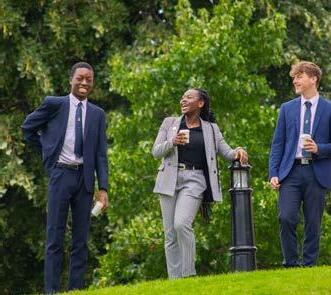
Every student has a Form Tutor who will provide them with daily support and guidance as well as more formal one-to-one tutorial sessions at regular intervals over the Lower and Upper Sixth. He/She will follow a student’s progress and get to know them well. Support is also readily available from subject teachers, Heads of Houses, Mr Harford (Director of Sixth Form), Mrs Kent (Deputy Head of Sixth Form), Mr Ruck (Head of Higher Education and Careers), and Mrs Hicks (Sixth Form Secretary).
Parents should normally contact the Form Tutor when sending any information from home, asking questions or voicing concerns. The Form Tutor, Head of House and Mr Harford can all be contacted by email or by telephone and are always happy to meet parents to discuss any concerns. If you would like to speak with a senior member of staff, please contact Ms Rebecca Davies, the Deputy Head with responsibility for pastoral care.

Ms Rebecca Davies Deputy Head: Pupil Development rdavies@bgs.bristol.sch.uk
There are six Houses in the school, each named after the current Head of House and identified by a colour that does not change. All new students join one of the Houses, taking into account any family connections, and remain in it during their time at the school.
Students will come into contact with many different members of staff, but the connection to other members of the House, staff and students, remains constant.
The Houses provide a platform for numerous social, cultural and competitive activities. The weekly House Assemblies provide opportunities to mix with students of different ages. There are inter-House competitions in the main sports as well as in squash, badminton, chess, debating, music, drama and dance. The Houses also put on entertainment evenings, raise money for nominated charities, and organise evening social events.
The House system has a long history and is one of the great strengths of BGS. We hope that students will gain maximum enjoyment and benefit from full participation. One of the parts of BGS life that the students look back on most fondly is that of the House; the shared memories and support they enjoyed within their House stay with them forever.
It is the aim of the school to provide every pupil with the opportunity to achieve their full potential.
Any concerns regarding a pupil’s learning may be raised at any stage by BGS teaching staff, pupils or parents. The Sixth Form team and the Head of Learning Support will work with the family to draw up a strategy to best support the pupil. A Confidential Information Sheet (CIS) will then be created and the pupil will be added to the Learning Support Register so that teaching strategies and targets can be put in place. Where appropriate, special arrangements for Exam Access Arrangements (school and public) will be organised by the Head of Learning Support.
Regular meetings with parents and pupils ensure that a pupil is fully supported and that their learning needs are fully met.
As a public examination centre we are required to have an established relationship with any learning specialists who complete full diagnostic assessments for our pupils. We have two main external assessors who regularly come in to assess pupils; the Head of Learning Support will be in touch with parents to arrange these assessments.
The Learning Support Department works with the Head of Sixth Form and the Future Pathways Department to ensure that pupils applying for university have excellent support to ensure their learning needs continue to be met after they leave BGS. We hold regular meetings with pupils to discuss further education and funding available, such as the Disabled Student Allowance (DSA).

Mrs Corinne Kempt Head of Learning Support ckempt@bgs.bristol.sch.uk
The BGS Counsellors, Janine Gayler and Mandy Collard, provide professional and confidential one-toone sessions for any student wishing to explore and understand difficulties they may be experiencing.
The Counsellors offer a nonjudgmental and non-directive approach in supporting students’ personal development using a variety of interventions.
Counselling sessions are confidential unless a student is in danger or at risk of harm. In such circumstances, the Counsellors will liaise with the Safeguarding Lead in School to ensure that the student is safe and to put in place any extra support they may need.
Students are welcome to self-refer by completing a Counselling Referral Form, which can be accessed via Sharepoint or by speaking to a member of staff who can refer on their behalf.
Mrs Mandy Collard mcollard@bgs.bristol.sch.uk
Mrs Janine Gayler jgayler@bgs.bristol.sch.uk

Information about key members of staff can be found on pages 6 and 7 of this booklet.
The Medical Room is opposite the main entrance to the Senior School. The School Nurses are available to treat students who become ill or have an accident during the school day, and will contact parents and carers to arrange collection if the student is not well enough to remain at school.
If a student becomes unwell during Games at Failand, during activities or on a school trip, they will be treated by a member of staff who is trained in first aid. In the case of a serious accident or illness, we will endeavour to contact parents and carers as soon as possible to advise of any treatment given or action taken, including if a student needs to be escorted to hospital.
If a student has an injury that requires them to use crutches, they should speak with one of the School Nurses upon their return to school.
If a student becomes unwell at home, they should be kept there to rest and recover and, where necessary, taken for a medical review. Unfortunately, the School Nurses are unable to operate as a consulting surgery; students should not go to school for the purpose of seeing them. Please note, any child with diarrhoea and/or vomiting symptoms must stay away from school until they have been free of symptoms for 48 hours and feel well.
Students should visit the Medical Room for the administration of any over-the-counter medication that they require and not carry a supply in their bags. For any other medication, an ‘Administration of Medicine’ consent form should be completed and given to the School Nurses along with the medication (which should be clearly labelled and have a valid expiry date) for them to keep in the Medical Room.
If a student has a diagnosed medical condition, please ensure full details are provided on the Medical Form which parents must complete prior to joining the school.
Any student requiring a reliever inhaler or an Adrenaline Auto Injector (AAI) should carry these with them at all times. If a student requires a reliever inhaler or AAI, please contact the School Nurses to discuss this in more detail.
Sister Anna Iacono School Nurse medical@bgs.bristol.sch.uk 0117 933 9896

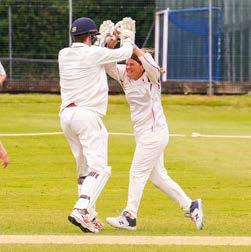
Looking after yourself: Your mental and physical wellbeing is our first priority. Feeling good about yourself is central to your health. Look out for the health of your friends too.
We would like to work closely with you and your supporters at home to help you maintain a healthy lifestyle in and out of school. We would like to create a caring environment in which you feel you have the support and nurtured confidence to enhance and build your sense of worth and fulfilment.
While you work towards your future goals, please remember that the people in your home support network are your biggest supporters; appreciate them and work hard to keep them on your side. Share your thoughts, concerns and aspirations. We’ve added some suggested advice for your support network too.
Advice for support network: make active steps to keep your young person on-side. Talk. Be flexible. Persevere. Be each other’s champions!
We hope you will use the following pointers to help you along the way. If things are not okay, we hope you feel able to come and talk to someone so we can provide reassurance and look to get things back on track for you.
Be active: Physical activity is good for our minds and bodies, reducing stress and anxiety and boosting our self-confidence. Fill your lungs with fresh air and give your heart a work out. You’ll feel brighter, you’ll be healthier and study endurance will improve. But don’t overdo the exercise. Oxygenate your mind.
Advice for support network: walk with them to the shops and for a coffee. Encourage walks in the countryside.
Sleep: Your body and brain need nine hours – every day – to rest and recover. Memory is ordered during this time. Poor sleep routines are a major reason for underachieving. Remember that blue screens inhibit the sleep hormone. It is recommended that mobile phones and computer screens are limited or not used for at least two hours minimum before bedtime.
Advice for support network: create a sense of evening calm in the house. Encourage phones and electronic devices to be kept somewhere other than the bedroom overnight.
Nutrition and Hydration: Your diet fuels every cell in your body and provides essential nutrients for growth and brain function, so it’s important to eat a balanced diet, including a varied breakfast to energise your morning, while avoiding late evening meals to ensure good sleep. Additionally, drinking 2.4 litres of water or fluids daily is recommended to boost the immune system, reduce infection risks, and maintain both physical and mental functions.
Advice for support network: encourage them to take a break and cook up favourite snacks and dishes.
Wellbeing: Spend time away from the books and seek quality down time. Keep up pursuits that take your mind totally off the demands of your studies: jogging, gardening, dog walking, fishing, bird watching, team sports and activities etc.
Advice for support network: encourage the keeping up of commitments away from books, even if it sometimes feels counterintuitive following a period of perceived low productivity.
Pressures: There will be inevitable times of pressure and anxiety, and feelings of self-doubt. There’ll be good productive work days and days when things feel like they went nowhere, or even went backwards. Talk about it. When you have days like this, it is usually best to put the books to one side and come back to them later. Trying to keep taking little steps forward is good practical advice.
Advice for support network: schedule time-outs for a trip to the coffee shop, for lunch, dog walking, the cinema or retail therapy with you or their friends. There will be ups and downs along the way for everyone in the household.
External Services: Inevitably, up-and-down days happen but you are not alone, and there are external services that are happy to be a listening ear. Mind charity has created a list of external services that provide a listening ear where you can have a safe place to speak to someone.

Advice for support network: Mind offers options where you can speak to someone over the phone, email, text or via a chat service.
Breathe Deeply: Being conscientious and wanting to do well brings the inevitable partner of worry. When you are worried you may breathe more quickly and shallowly. Concentrating on your breathing being deliberately slower and deeper will help to keep you calmer and feel more in control. How: sit or stand up straight, inhale through your nose deeply, hold your breath for a couple of seconds, exhale slowly through your mouth, and repeat. Try yoga or mindfulness apps.
Advice for support network: make the home a place of calm.

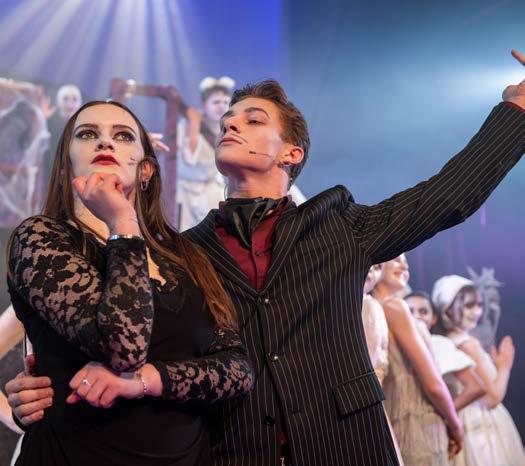
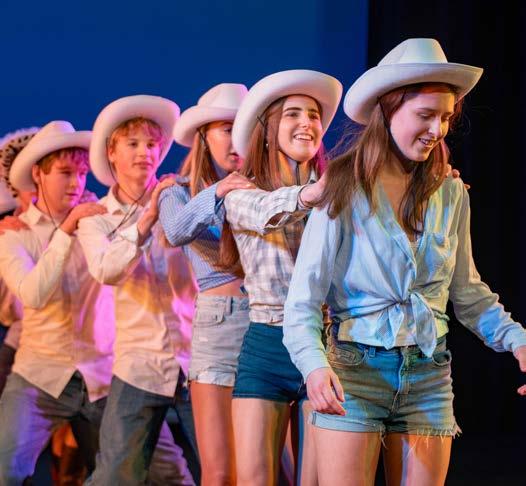
The School offers a wide range of extracurricular opportunities and we will encourage students to maximise their potential, both within and beyond the Sixth-form curriculum.
Sport is played and enjoyed at every level at BGS, and is valued for its physical and mental health benefits. BGS prides itself on encouraging involvement and achievement in sports at all levels of ability.
All members of the Sixth Form are expected to do something physically active as part of the Sixth-form curriculum. Every Sixthformer has Games on Thursday afternoons.
For those keen to be involved in school teams, there are regular after-school training sessions and sports fixtures. As well as fixtures in our main team sports, such as hockey, rugby, netball, cricket, and football, students also have the opportunity to represent the school in sports such as swimming, tennis, badminton, athletics, and squash. We are delighted that so many of our students choose to be involved with sporting fixtures and competitions, both in team and individual sports.
Sixth-form students can also take advantage of the school’s Gym, which is accessible for them to use during free periods, lunchtimes, and after-school.
A thriving programme of House sports events also offers opportunities for students to take part in friendly competition against their peers.
The Activities programme runs on Tuesday afternoons and offers Sixth-formers a way to broaden their interests and develop skills; the range of opportunities available is extensive and has included Climbing, Greenpower, Young Enterprise, Model United Nations (MUN), Food for University, and Yoga/Fitness, for example.
Sixth-formers can also choose from a full range of extracurricular opportunities in drama, dance, music, debating, public speaking, and the Duke of Edinburgh’s Award Scheme.
Teams, fixtures and results can be found at: www.bristolgrammarschoolsport.co.uk
In a typical BGS year we run a large number of trips and visits. Opportunities include excursions to the theatre, galleries and museums, House bowling trips or an evening meal for a form as well as UK and overseas residential visits. All year-groups have the chance to go on residential trips, some are open to all and some are restricted to particular yeargroups, or to students studying a particular subject. We try to keep costs modest so that as many as possible can participate; for the more expensive trips payments are usually staged over two terms or more.
Information will be sent to parents about the confirmed programme of residential trips at the start of the academic year and then at intervals as new opportunities arise.
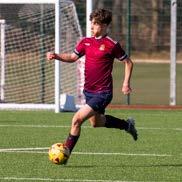
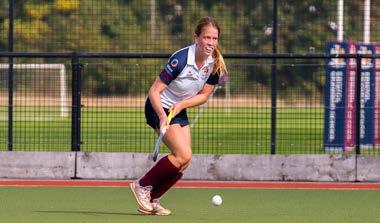
Throughout the school year, we offer a wide array of lunchtime and after-school clubs and societies catering to a diverse range of interests. These clubs are open to all students, so do ask your tutor if you would like to get involved, and they will let you know who to speak with.
From Monday to Friday students can engage in activities that span from the creative arts and sports to academic societies.
Some examples include: Five-aside Football, Art Printing and Textiles, Amnesty International, Astronomy, Badminton, Baking, Board Game Club, Cello Ensemble, Charity Committee, Chess, Christian Union, Classics, Dance, Debating, Dungeons and Dragons, Geography Society, Greenpower, Handball, Languages, Maths Inspiration, Model United Nations, Photography, Programming, and Stage Crew.
Every year the clubs and societies that run are subject to change, so this is not an exhaustive list.
Clubs and societies provide great opportunities to explore new hobbies, develop skills, and build friendships.
The Peer Mentoring system provides an extra avenue of communication for any younger pupil who wishes to talk through an issue or concern. Pupils may not always be comfortable discussing their concerns with adults but may feel able to talk to a Sixthform student who has enough experience and understanding to provide a response different from that of the peer-group.
Students selected to become Mentors are trained to listen carefully and to offer advice, and they receive extensive training for this. A member of staff meets all Peer Mentors once a week to monitor progress.
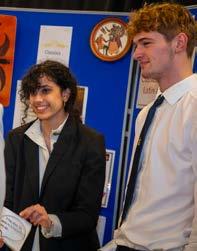
Student top tip:
“Get involved in as many extracurricular activities as you can. This is a great way to make new friends.”

Music is thriving at BGS. Our large variety of groups – including orchestras, choirs, Music Technology Club, and over twenty smaller chamber ensembles and bands – gives all students, regardless of their level of musical expertise, the chance to develop a love of performing. We offer a variety of stimulating and fun performance events throughout the academic year, ranging from impromptu pop-up lunchtime sessions to evening concerts, as well as prestigious concerts at St George’s Bristol and an annual Battle of the Bands competition.
Dance
Dance offers many opportunities to get involved outside of curriculum lessons. There are weekly lunchtime clubs all year round that lead to performance opportunities, competitions and festivals both inside and outside of school across the South West. These include Contemporary, Ballet, Lyrical and Modern Dance.
We annually hold a Whole School Dance Production with recent productions of Cruella, A Christmas Carol, Oz the Great and Powerful, Revelio, Maleficent, Nutcracker, and Narnia, and students can enter solos and group pieces into our annual House Dance competition.
We also run Surge Dance Company, which offers elite dancers the chance to be pushed in a number of genres and perform as part of many events. In addition, our Senior students have the opportunity to perform at The Tacchi-Morris Arts Centre in their annual Youth Dance Platform, Spring Forward
The Drama Department gives students a wide range of opportunities to pursue their passion outside of their academic studies. Pupils in all year-groups can take part in The Bristol Schools’ Theatre Festival, the Senior School Play or Musical, the House Drama competition, and GCSE and A level performance evenings.
Every year we run several theatre trips, workshops and a biannual tour to the Edinburgh Fringe Festival for the A level Theatre Studies students to perform –most recently Shouty Arthur! and Eurydice, with Shouty Arthur! named as the Best Family Show and the Best Show for Children by the Edinburgh Fringe Review.
Our main school production is always an impressive event; recent productions include Annie, The Odyssey, Peter Pan, School of Rock, Guys and Dolls, Beasts and Beauties, and Romeo and Juliet
The school also has its own Stage Crew, a body of students who are responsible for building the sets, rigging and operating the lights, and producing sound effects.
Speech and Drama lessons can be taken individually or in pairs. Further details have been sent to you separately.






curriculum
The BGS timetable is based on ten days each fortnight with typically five hour-long lessons every day, including three in the morning and two in the afternoon, unless students have Games/Activities on an afternoon when they’d have four lessons before lunch.
All A level students study three subjects in the Lower Sixth, and will have eleven lessons per subject per fortnight. They also choose an elective subject at the time of making their subject choices, which will have four lessons per fortnight; typical options include the Extended Project Qualification (EPQ), Mathematical Studies, Creative Writing, Computer Aided Design (CAD), the Cyber EPQ, and Sports Leadership.
All Sixth-form students will also have two afternoons dedicated to Games and two afternoons of Activities every fortnight, as well as two Wellbeing sessions.
Marking and assessment
Teachers provide regular feedback to students in a variety of formats. All feedback is designed to inform student progress. They will feedback praising both effort and outcome, as well as identifying ways they can improve performance. The nature and regularity of the feedback will vary from subject to subject. Students are encouraged to respond to written feedback from teachers and engage in an ongoing dialogue to continually improve the quality of their work.
Assessment in each subject follows the exam board requirements. As a school we also report and assess based on ‘Effort’, looking at aspects of learning and award a mark between 1–4 (with 4 being the highest). We also report on this in subcategories, including engagement in lessons, engagement outside of lessons, teamwork and organization, indicating whether students are meeting BGS expectations or are exceeding or below these. This is an indication of students’ engagement with their studies, and reveals the extent to which they are enabling themselves to be as successful as they possibly can in their learning. Attainment is assessed and graded using A*–U for A level.
Reports to parents and Progress Overview Meetings
Parents are invited to an evening early in the Autumn term to meet with Form Tutors and hear a presentation from Mr Harford on the year ahead.
In the Lower Sixth there will be two Progress Overview Meetings – in November and June – where parents and students meet with subject teachers to discuss their academic progress and future aspirations. In the Upper Sixth Progress Overview Meetings are held in the Autumn and Spring terms. Progress reports are regularly sent home to reflect attainment and effort, with predicted grades reflecting present performance.
A first set of predictions for UCAS applications (UK university entry) are made following the end of Lower Sixth Exams.
Student top tip:
“Make
sure you do your homework well before the deadline. Leaving work until the last minute puts you under pressure.”

In the Sixth Form students have the independence to specialise in their chosen subjects; a breadth and depth of interest in and beyond their specifications should motivate their studies as they plan for university courses. We expect students to work closely with their subject teachers as they support and stretch students’ learning.
Whatever a student’s target grades, we encourage them to aim high, ask lots of questions and ensure proactive communication with their teachers.
Organise: An ordered memory requires an ordered approach: files (paper and electronic), timetables, work spaces. Plan your work timetable, but try not to be too prescriptive. Let some flexibility into your regime.
Workspace: A space free from distractions is essential. If possible, don’t work in your bedroom, as this should be a sanctuary of tranquility and sleep. Mix up the places where you study; you could try the kitchen table for an hour or so, or at school and public libraries. Regularly get up for a stretch or a walk around.
Workmates: Surround yourself with peers who wish to study. Help others to succeed. Explain things to each other: it really helps the learning sink in. Improve your communication and answering skills to mutual benefit. Share the pressures of study.
Advice for support network: get the healthy (and occasionally unhealthy) snacks in, and give lifts to the houses of study partners.
Intensity: Shorter, sharper highintensity sessions will be more productive than longer openended periods that drag. Split up your work into topics. You will spend longer on some topics than you originally planned, but don’t pressurise yourself as this is completely normal. Remember that exam preparation is a marathon not a sprint.
Advice for support network: rather than encouraging more work sessions, encourage short breaks away from the books; young brains needs rest breaks.
Coaches: Your teachers’ support is gold dust; buy in to it. Treat them as mentors; seek out all their wisdom. Ask questions in and out of class. Probe your understanding and be curious. Prioritise any extra help sessions on offer.
Memory: Memory creation begins in class. Good memory requires imagination and repetition, and this takes time and commitment. Use a wide variety of revision techniques across your subjects. Keep your brain’s hard drive healthy: sleep, diet, exercise.
The Library is an essential part of teaching and learning at BGS, providing support for staff and students throughout the school day and beyond. The Library is welcoming and well-resourced, and is an excellent place for students to undertake study, research and reading. Comprising over 33,000 books, DVDs, CDs and a variety of printed and online journals and databases, the collection is kept up-to-date and relevant to students’ needs. There are also two dedicated iPads for catalogue searches and sixteen laptops.
The School Library is open from 8.15am to 6.00pm on school days (except when BGS closes early on the last day of term).
“Read around the subjects as it will help you to learn the
content thoroughly, building on the work you do in lessons. Don’t
wait for your teachers to tell you to do it –it
is part of your independence in the Sixth Form.”

Aspects to Celebrate Points are awarded for particularly good pieces of work, sustained commendable effort or significant improvement. Students can also get Aspects to Celebrate Points for their approach to tasks in lessons or for participation in different areas of school life. At various thresholds pupils will receive Commendation Cards and a reward in the form of a school privilege. Students receiving points over 100 points, will meet the Head who will issue a Commendation Card, and the pupil will receive a prize; reaching further thresholds include an invite to the Head’s lunchtime banquet meal.
A Merit Card is issued for significant contribution to school life or to an event outside of lessons. It automatically awards three Aspect to Celebrate Points to the student and is awarded to them by their Head of House.
Commendation letters may be sent home from a member of staff in cases of particularly outstanding work or praiseworthy achievement.
House Colours reward success in the many areas of House life, as well as participation and commitment over a period of time.
School Colours may be awarded for excellence in any area of school life. Students are nominated by staff for School Colours that the Colours Committee consider before endorsement from the Head. Students receive either a tie or a badge.
Half Colours may be awarded to a few of our most talented students who have not quite achieved the demonstrable excellence required for Full School Colours, but who
have performed to a very high standard. Half Colours may be awarded for contributions to any non-academic area of school life; students may receive separate sets of Half Colours in several activities.
If a student fails to produce homework or if the subject teacher feels they could have done better, they may be required to redo the task. A new deadline will be agreed and the pupil will have an Area for Development point logged.
Area for Development Points are issued when students have been unreliable or are in need of help with their approach to school life. Form Tutors, the Head of Sixth Form and Heads of House monitor how pupils are doing in this area and look for ways to help them improve their approach. Targets may be set to focus on particular areas of improvement.
A Lunchtime Detention (thirty minutes) may be given for a misdemeanour that contravenes the School Regulations or guidelines or where other support strategies to encourage a change of approach have not been successfully adopted by a student. Parents and students are informed by an email and students receive a calendar appointment.
During the detention the pupil will complete a reflective booklet that seeks to explore the nature and impact of their actions in the related incident and to consider their future responses.
An After-School Detention (fortyfive minutes) may be considered as a consequence after three Lunchtime Detentions have been served, or for a single more serious offence. Unauthorised absence at a Lunchtime Detention will also result in an After-School Detention.
A full Behaviour Policy can be found on the School website, or is available from the School Office on request.
Parents will have the opportunity to discuss the matters concerned.
A Head’s Detention (seventy minutes) may be the consequence considered for a very serious offence, or for an unauthorised absence from an AfterSchool Detention, or following three After-School Detentions. Parents and the student will be invited in to discuss the matters concerned with the Head or a Deputy Head, together with their Head of House or Head of Sixth Form. The Head’s Detentions are held after school on Fridays and are supervised by a senior member of staff. Detention reflective booklets are completed in After-School Detentions to consolidate the student’s understanding of the incident, its nature and negative impact.
A Suspension internal or external exclusion (sometimes called ‘a requested withdrawal) will be considered in certain circumstances. Parents will be invited into school to discuss these matters if this consequence is to be imposed. If a student receives three Lunchtime Detentions, they will be asked to attend a Post-detention Interview with a member of the Senior Leadership Team and their Form Tutor or Head of Sixth Form or Head of House. The meeting will discuss the reasons behind the accumulation of detentions and plan a way forward. An agreement will also be formed at the meeting and the student’s progress will be monitored. At this meeting a decision will also be made as to whether all future detentions should be AfterSchool Detentions. All students will be supported through disciplinary consequences by one or more staff who have pastoral responsibility for them, whether that is their Form Tutor, Head of House, Director of Sixth Form or another staff member considered most appropriate in the circumstances.
We are an open, outward-looking school: we encourage students to explore aspects of life in the wider world and prepare for further study and eventual employment.
Almost as soon as students enter the Sixth Form they are planning their escape. In other words, what will they progress to? Will it be on to university, an apprenticeship, the opportunity to study abroad, or the world of work at 18? Whatever it may be, the Future Pathways Department is here to help with the processes students will need to go through. Research and decision-making is key, but so too is discussing their ideas and plans with staff, and the Future Pathways Office is always open for students to visit or book in a consultation.
Our programme of information, advice and guidance encourages students to take ownership of their plans and research the options available to them. Delivery is through our extensive Wellbeing programme, tutorials, lunchtime and after-school sessions. All students can arrange one-to-one meetings with the Future Pathways team – whether that be for specific advice and guidance or a more general ‘coaching conversation’ to help support their individual exploration of career pathways. Furthermore, we produce a weekly Future Pathways Bulletin throughout the year, which provides a range of suggestions, opportunities and information to students, delivered directly to their inboxes every Friday morning.
We make extensive use of digital resources to support students with their research. Students will use the Unifrog platform to explore their skills and interests, research different careers and subjects, and compare potential higher education courses in the UK and worldwide alongside apprenticeship opportunities.
Students can save their research for later review and action. It also contains a wealth of features, articles and guides covering application advice, student wellbeing and the wider world of work.
Further online sources of information are highlighted and explained to students at the most appropriate times, with links readily accessible from their iPads for independent exploration and follow-up. Additionally, there is a range of more ‘traditional’ resources available both in the Future Pathways Office and the Library.
While the majority of our students make successful applications to UK universities, support is given to those considering higher education overseas, apprenticeships and employment to ensure that students make informed decisions about whichever pathway is the best ‘fit’ for them.
Students considering Oxbridge applications (typically forty a year) are well-supported in the requirements of this application process, as are those considering Medicine, Dentistry, Veterinary Science or Law courses. We also arrange guidance on interview technique using the support of local business people, Old Bristolians (OBs) and parents who have professional experience of interviewing.
Additional events and conferences draw on specialist guests from universities, businesses and other organisations to introduce students to the intricacies of the university application process, what they can do to stand out from the crowd and provide further awareness of the choices available after they leave school. We also encourage students to make use of our extensive OB network through events, meetings and the mentoring scheme to offer advice on a wide range of careers and professions. Our new OBs speed networking event offered students the opportunity to practice their ‘first impressions’ in a safe environment. Furthermore, there are information evenings for families throughout the year to provide up-to-date guidance and offer advice on how best to support their children in making these important decisions.
No matter which pathway students wish to follow or what they are interested in doing – or even if they have no idea at all – the Future Pathways Department is on hand to work with students and support them through the journey to find their next step.
Mr David Ruck Head of Future Pathways futures@bgs.bristol.sch.uk
Members of the Sixth Form are expected to observe these requirements and maintain a good standard of appearance, not only in and around the school but also when coming to or leaving school, and when leaving the site during the day.
The Sixth Form dress code aims to promote a community sense of identity and social inclusion, creating a feeling of belonging.
The following dress code and expectations were drawn up in a consultation with the Sixth Form Council:
All Sixth-form students are expected to wear a smart suit; this can be a trouser or skirt suit.
Suit jackets and the accompanying trousers or skirt should be the same colour. Subtle patterning, such as pinstripe or fine check, are permitted. Suits may also be complementary in style, for eg a plain black jacket worn with black trousers or skirt with a thin pinstripe or fine check and vice versa.
Skirt length should be at least 2/3 distance from the top of the thigh to the knee. Trouser length should be by the ankles. Skirts should be lined and not be tight fitting.
All students are expected to wear a smart shirt or a blouse with a collar and sleeves (long or short). Longer shirts and blouses should be tucked in. Low necklines are not permitted.
The collar of the shirt or blouse, and the tie where one is worn, should remain visible.
Students can wear: A plain V-neck fine knit jumper or cardigan or a quarter zip jumper. Any logos should be small and discrete. Hooded jumpers and sweatshirts are not permitted.
The wearing of a tie in Sixth Form is optional; a personal choice. If a tie is worn, it should be worn with a shirt buttoned up to the neck. If a student wishes to wear a tie it should be a school tie which can be purchased online from the school’s suppliers, Schoolblazer.
Alternatively, School Colours ties and Prefect ties may be worn. County Colours/representative ties may be worn only on the days that a student will participate in the relevant activity and only if still current. An academic award tie, such as an Arkwright Scholar tie, may also be worn.
Shoes should be smart, polished and in keeping with the rest of the Sixth Form dress code. Styles that are not permitted are: trainers, boots, high heels, and ballet pumps.
Shoes should provide protection to the whole foot and be safe to wear around the school site.
Students must wear the kit appropriate for the sports or activities they participate in. Please find the breakdown of the kit students should will need on page 30.
Every BGS Sixth-former should have a BGS fitness t-shirt* for use, as required, in their Games sessions.
Sport fixtures are one of the times when students and the school are at their most visible. Team unity when arriving at, preparing for, and playing in fixtures shows the pride we take in our performance when representing the school and supporting our teammates.
Sixth-form students are expected to look smart and take pride in their role as leaders, both in and around school and also when travelling to and from the school to Games, sport training sessions and fixtures.
Parent top tip: “There are pre-worn uniform sales and there is also a Facebook page run by BGS parents where you can buy and sell uniform.
Guidance regarding dress associated with religious observance
Students must have due regard for how the clothes they wear affect:
• the health and safety requirements of different areas of the school: for example, long hair must be tied back and items such as a crucifix on a long chain must not be worn in Science laboratories, DT workshops, in the Food & Nutrition kitchens or when participating in Games and PE
• security requirements: individual students must be identifiable in order to maintain good order and so we may easily detect intruders: a hooded top, for example, may never be worn except as part of the Games kit
• teaching and learning: a student’s face must remain unobscured so that a teacher can judge their engagement with learning and secure their participation in discussions and practical activities. Hence a niqab, for example, may not be worn. In line with their religious observance, students may wear a headscarf, skullcap or turban (including rumal, patka, dupatta or chunni).
Rastafarians will never be asked to wear borrowed clothing. The modesty of dress in religions such as Judaism, Islam and Plymouth Brethren will always be respected.
A Sikh student who has gone through the Amrit Pahul ceremony may wear a kirpan provided this is clearly ceremonial and not displayed openly, sewn into the sheath so that it cannot be drawn, and worn under clothing to ensure the highest possible safety at all times. Before a kirpan is worn the parents of the student, and the student, must sign a form available from the School Office on which they agree that it will not be shown in school. The form gives a waiver of indemnity against claims for negligence arising out of simply wearing their kirpan. This will apply only if the kirpan is intentionally misused by the wearer.
Adhering to the Sixth Form Dress code
BGS expects Sixth-form students to dress as if they are attending a professional or business interview; smartly wearing a suit sets a professional tone of pride and selfconfidence.
Dress is a personal responsibility, but Form Tutors will advise those who fail to observe these guidelines; persistent offenders will be referred to Mr Harford or Mrs Kent.
Student top tip: “Make sure you look smart and feel comfortable.”
Every year we hold a Cultural Dress Day to celebrate and recognise our school’s diversity
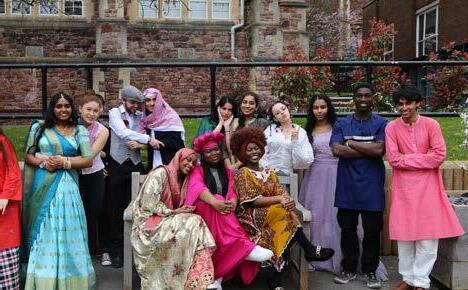
Pupils already at BGS can continue to wear Games or PE tops already bought for training (these are maroon and white respectively).
Students not looking to represent the school in a team sport should ensure they have the basic ‘Gym/ Sports Hall-based Games Sessions’ kit.
Gym/Sports Hall-based Games Sessions
Navy BGS fitness t-shirt*
Navy or Black shorts, skort or leggings (plain and good quality)
A plain base layer, or plain black or navy sweatshirt is recommended as the Sports Hall can get cold.
Trainers suitable for wearing indoors
Netball
Navy BGS fitness t-shirt*
Navy BGS shorts* or BGS ‘skort’*
White sport socks
Trainers suitable for outdoor netball courts
Cricket
Navy BGS fitness t-shirt*
Cricket colour shirts will be issued for senior players.
Navy BGS shorts* and/or BGS tracksuit trousers*
Cricket bat and protective wear can be purchased or issued by the school for training and matches
Cricket whites may be required for some matches
Rugby
Navy BGS fitness t-shirt*
Navy BGS shorts* or BGS ‘skort’*
Plain maroon socks
Mouthguard
Rugby boots must be suitable for grass and 3G
Football
Navy BGS fitness t-shirt*
Navy BGS shorts* or BGS ‘skort’*
Plain maroon socks and shin pads
Football boots must be suitable for grass and 3G
Hockey
Navy BGS fitness t-shirt*
Navy BGS shorts* or BGS ‘skort’*
Plain maroon socks and shin pads
Mouthguard
Astro boots and Hockey stick
An asterix (*) denotes items that must be purchased from Schoolblazer.
As part of our curriculum all BGS Sixth-form students are expected to participate in Games/sport to promote physical and mental health through exercise, competition, camaraderie, and friendship.
When considering what kit to purchase, please wear the BGS clothing that is most appropriate for the student’s chosen Games option. Some examples are below:
Example one: If their option is badminton, the student could travel to school in their suit, changing at lunchtime into the blue BGS sports top, their own navy or black leggings/trousers/shorts, socks and trainers, and then change back to travel home. Equally they could choose to purchase the full school tracksuit and wear it over the top of their Games kit.
Example two: if a Failand option is chosen (hockey/netball/rugby/ football etc.), the student can attend school in their suit and change at Failand, or alternatively, wear the full school tracksuit over the relevant Games kit for the day.
The most popular t-shirt to train in is the blue BGS sports top, but current Year 11 pupils who already own white/maroon tops are welcome to wear these as well.
If a student is only participating in one Games session per week, the only garment they’ll need is the blue BGS sports top.
Regular sports participation will likely require more sets of kit. Please see the opposite page for further guidance on kit needed for the specific sports. Pupils are welcome to email the relevant members of Games staff if they are unsure.
On Thursdays when the Sixthformers have Games, students can travel to and from school either in a suit – adhering to the Sixth Form Dress Code – or in full BGS-branded sports clothing (full school tracksuit over Games kit).
Students who do not wish to play representative sport/do not want to purchase the full tracksuit may change at lunchtime at Failand or in the Sports Hall. Please note that other tracksuits are not permitted.
If travelling to and/or from Failand or fixtures on the bus, full BGS tracksuit*/a suit adhering to the Sixth Form dress code must be worn.
Students may wish to bring in a towel to shower after Games. For safety reasons, aerosols are not to be used in school or at Failand.
Safety items are non-negotiable: students will not be able to take
a full part in Games sessions or matches without the following items:
Rugby – mouthguard
Hockey – mouthguard and shin pads
Football – shin pads
All long hair needs to be tied up for sport sessions and matches, and any jewellery must be removed.
If you have been selected to represent the school in a sport fixture, the Head of the Sport will confirm the dress code, which will either be a suit or BGS tracksuit* to and from the venue. As venues offer differing changing facilities, all students representing the school will need to purchase a full BGS tracksuit*.
Team sets of dresses/tops/shirts etc. are issued to the players selected, and are retained by the school.
If a student and their parents/carers would like permission for particular garments or objects to be worn for PE and Games to conform with their religious or cultural traditions, the request should be made in writing to Mr Tristan Parris, Director of Sport. Permission will only be granted provided the student can still participate safely. No items of jewellery are permitted.
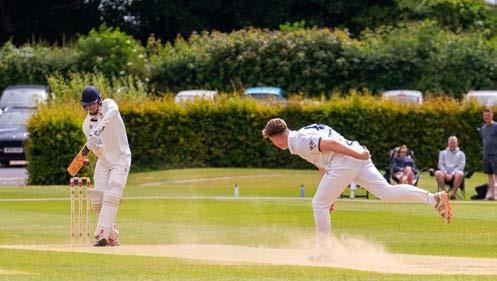
Every article of clothing, including shoes, trainers and Games kit should be clearly and indelibly marked with the student’s name.
The student’s name, or initials, should also be indelibly marked on personal property, such as their watch, calculator, etc. All mobile telephones should be securitymarked inside the cover with a house number and postcode. Please also keep a record of the SIM card number.
Students are discouraged from bringing valuable items to school. All Sixth-form students are allocated their own lockers in the Sixth Form Centre for which keys are issued. At the start of a Games lesson valuables should be handed in to the member of staff running that session; they should never be left in bags or coat pockets in the changing rooms.
Students are responsible for the security and safe use of all their personal property, and for property lent to them by the School. We may be able to assist in the
temporary storage of valuables, but will not accept responsibility for loss or damage to valuables in circumstances outside the school’s reasonable control.
Students should ensure their belongings are clearly marked with their name.
All items of lost property handed in are sorted and recorded. If an item is named, an email is sent to the student and parent asking them to collect their property from the BGS Helpdesk.
Reports of missing unnamed items are logged and regularly checked against incoming unnamed items; when matches are found, students and parents are emailed to make them aware.
Unclaimed unnamed items are held for one half-term; any items that are not collected by this time will either be passed on to the BGS uniform & costume sell/swap Facebook group or given to charity.
If students are studying Mathematics, we strongly recommend one of the following calculators. We sell these in the Maths Department, so we advise buying them through the school in September:
CASIO FX-991CW (ClassWiz)
This is an advanced scientific calculator, which offers a wide range of numerical, calculation and statistics functions and a high-resolution display with a fast processor and large memory, as well as spreadsheet functionality.
CASIO FX-CG50
This is Casio’s most advanced graphic calculator; it uses the latest display technology with a full-colour, high-resolution backlit screen. It has natural textbook display, innovative picture plot function enabling analysis of images and video, plus an extensive range of functions including dynamic graphs, geometry, spreadsheet and e-Activity.
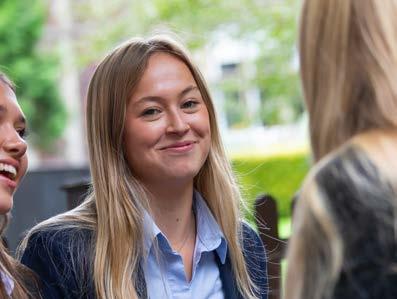
Bristol Grammar School uses My School Portal to communicate with parents/carers, and to share information with you about students and the school.
The portal is a ‘one-stop shop’ for parents/carers and will enable you to sign up for school trips, book After School Care, access school reports, view timetables and more.
Parents/Carers will receive an email ahead of a student joining the school with details of how to access the system. The email will also include a link to a guide to using My School Portal and the information available on it.
We send out a weekly email to all parents on Wednesdays during term-time. This email includes information about upcoming: school trips, events and diary dates.
https://www.bristolgrammarschool.co.uk
The website is a good source of information and news. Wholeschool information such as policies and procedures, contact details for all teaching staff, term dates and details of our Friends of BGS are available on the website.
You will receive a variety of letters each term. Where possible, all other communication will be sent by email. If any contact details change, please inform us immediately. You can do this by using the data collection option within My School Portal, or if you’d prefer, by email, via the website or by telephone. If parents do not use email they should let us know in writing.
We are aware that some students do not live with both parents. Unless there is a Court Order in place, copies of communications will be sent to both parents with parental responsibility for a child provided details are supplied.
We will text the first mobile contact number when there is significant information we wish to communicate urgently about issues such as school closure, severe weather and exam arrangements. We will also send a text if a student has not registered and we have no reason for absence. Please ensure that you inform the school immediately if your first mobile contact number changes
Staff email addresses are formed as follows: one initial followed by surname followed by the school’s email, for eg psmith@bgs.bristol.sch.uk
Staff will be more than happy to respond to any queries, and will respond within two working days. This timescale has been implemented as many colleagues are unable to access their emails throughout the school day due to teaching or other commitments. Please contact Reception should you need to contact a member of staff urgently.
Parent top tip:
“Encourage independent learning and taking more responsibility, as this is a key part of being a successful Sixth-form student! They should be responsible for completing their own work, organising their commitments, etc.”

We hold numerous whole school events throughout the year ranging from school plays, dance and music recitals to seasonal celebrations and commemorations, such as the Christmas Carol Service, Charter Day and Remembrance Service. Parents are warmly invited to support their children by attending many of these events. There are also less formal events that the students can get involved in, such as House Concerts, dance competitions, House Singing, meals and social trips such as ten pin bowling.
Prize Giving takes place during the Summer term. We award prizes to students from every year-group in the school. Our prize-winners are identified through achievement or endeavour in many areas: academic, sporting, cultural or personal. In one way or another each of our prize-winners has done something remarkable.
Look out for updated information throughout the year on the school website where you can also book for many events; events are advertised in the weekly email.
The School Song, Carmen Bristoliense, represents the very essence of what it is to be a student at BGS, so we have included the words below. We are not asking new students to learn it by any means, but there is no harm in familiarising themselves with the words.
The School Song is sung at special occasions, such as our end-of-term Assemblies, and Charter Day – students find that it unites us as one school.
Carmen Bristoliense
Nunc universo gaudio (Now with universal joy)
Ludo pensisque functi (Having finished with work and play)
Scholam dilectam sedulo (Let us all join together to sing)
Concelebremus cuncti (In praise of our beloved school) Iam quadringentos amplius (For more than 400 years already)
Annos laudem meretur (She has been earning praise)
Merendo et durabimus (We too shall last by merit)
Dum nostra urbs servetur (As long as our city is preserved)
Sit clarior, sit dignior (May she be more famous, more worthy) Quotquot labuntur menses (However many months pass by)
Sit primus nobis hic decor (Let this be our first cause for pride)
Sumus Bristolienses (We are Bristolians)

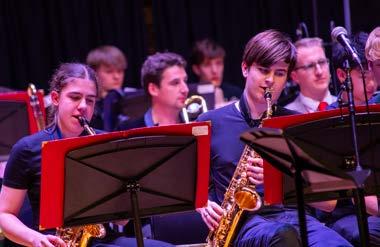
Bristol Grammar School Foundation and Old Bristolians’ Society
Parents are warmly welcomed into the BGS community, and are invited to attend our social events and to offer professional advice and support through our mentoring programmes. On leaving BGS, your child will become an automatic member of the Old Bristolians’ community; a global network that includes people involved in finance, law, music and the performing arts, medicine, sport, media and business. We work to engage these OBs to support senior students and recent leavers with university and career choices beyond school.
The Old Bristolians’ Society has an annual programme of events, both social and professional, including reunions, lectures and dinners. We provide regular communication and updates to support our OBs at every stage of their career development. We can also put friends in touch with each other, source exam results and keep people in touch with their old teachers.
Through our Foundation we raise funds, proudly, to support some amazing children who add so much value to BGS. We are committed to ensuring that there is no barrier to an education for those with talent and determination, regardless of their background and financial circumstances. We ask for financial support from our OBs and friends to do this, as giving back in this way is very much part of our culture and heritage.
If you’d like to know more about our work, you are always welcome to speak to us.
We hope to see you at one of our events soon.
The Foundation and OB Community Team
The Friends of BGS bring parents, friends and family together for social occasions. It is not primarily a fundraising body, though if events make money the Friends grant it to the School for a wide range of items and activities that enhance the education of our students.
If you would like to be involved with the Friends of BGS, or help with social events, please email Friends@bgs.bristol.sch.uk
Parent top tip:
“Encourage your son/ daughter to take advantage of new activities: DofE, public speaking, volunteering in the Infant School, etc.”
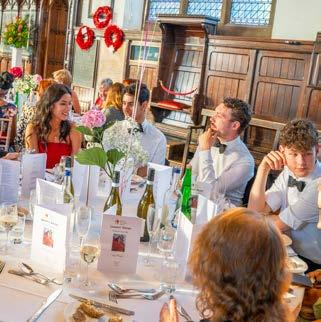
Every student should feel safe and protected from any form of abuse, which means any kind of neglect, non-accidental physical injury, sexual exploitation or emotional ill-treatment. Our policy and our commitment at BGS is to take all reasonable measures to safeguard and promote the welfare of each student in our care.
Miss Fran Ripley, Deputy Head, is our Designated Safeguarding Lead. If you have any child protection concerns, these should be raised directly with her. There is also a designated Governor for child protection who oversees the school’s implementation of the Safeguarding and Child Protection Policy and Procedures. Parents should be aware that the school has a legal obligation to protect all students from abuse and, if an allegation of abuse is made, to consider whether it can be dealt with under the school’s internal procedures or whether a referral to Bristol Children’s Services or to the Police is necessary. In such cases, parents would always be kept as informed as possible.

Miss Fran Ripley Deputy Head: Safeguarding fripley@bgs.bristol.sch.uk
Many of our policies can be downloaded from our website www.bristolgrammarschool.co.uk
Copies of all school policies are available on request from the School Office, telephone 0117 973 6006.
We want young people to be able to fully exploit the benefits offered by ICT while doing so in a safe manner. Online messaging, social networking and mobile technology effectively means that children can always be ‘online’. Consequently, their social lives, and therefore their emotional development, are bound up in the use of these technologies.
The latest e-safety guidance states that the breadth of e-safety issues can be categorised into three areas of risk:
content – being exposed to illegal, inappropriate or harmful material contact – being subjected to harmful online interaction with other users conduct – personal online behaviour that increases the likelihood of, or causes, harm.
In the Senior School there are dedicated PSHE lessons devoted to e-safety as well as an E-safety Committee involving children. There is also e-safety guidance in pupils’ Planners. The school operates an E-safety Policy for the staff and children which includes guidance on social media.
The purpose of the E-safety Policy is to ensure that the school community is kept aware of the risks as well as the benefits of technology, and knows how to manage these risks and keep themselves and others safe. It details the measures that the school has put in place to support this as well as the rules and restrictions around the use of ICT and other technology at BGS. Once they have joined the school students can access this policy via SharePoint, and it is also publicly accessible via the website.
It is an implied term of the contract for educational services that exists between the school and the parents of a student that photographs of the student may be taken and used by the school in accordance with normal custom and practice. Such custom and practice will include: set piece photographs of the school, House, team, theatre cast and snapshots of school activities. It has also been custom and practice for independent schools to use images of their students for marketing purposes, such as in prospectuses, promotional videos, displays on its website, the school newsletters or for internal training purposes.
The school’s Terms and Conditions specify that parents who do not want their child’s photograph or image to appear in any of the school’s promotional material must make sure that their child knows this and must write immediately to the Bursar, requesting an acknowledgement of their letter.
Parents, friends and other visitors to the school or a school event such as a sports match, drama production or presentation evening are authorised to take photos and videos. However, these are intended for personal viewing, and should not be made publicly available by uploading to YouTube or similar services. Publication of any such photos or videos would contravene child protection guidelines and may also be in breach of the Data Protection Act.
On a school trip or other event, staff and students are permitted to take photographs, which may then be shared with the group. Individual student photos are taken at the beginning of each year to form part of the student’s record. Photographs are stored and used as per the requirements of the Data Protection Act.
BGS is a phone-free school between the hours of 8.30am and 3.50pm. However, Sixth-form students will have the ability to use their phones while inside the Sixth Form Centre during these hours.
Inside these hours Sixth-form students may not use their phones and may not use headphones/ ear pods or similar outside of the Sixth Form Centre, unless given express permission by a member of staff. Phones will be confiscated if students use them without permission.
Students will be able to collect their phone at the end of the day from the BGS Helpdesk. If a phone is confiscated for a third time, parents/carers will be asked to collect the phone.
In an emergency where students need to contact home, they must inform a member of staff who will deal with the matter. Students who feel unwell must always see one of the School Nurses and not simply phone home to arrange to be picked up. In an emergency where parents/carers need to get messages to students, they must contact Reception who will pass on the message not contact students directly on their mobile phones.
Mobile phones cannot under any circumstance be taken into examination rooms. This is a breach of exam regulations and will lead to disqualification from the exam and potentially others.
Students must appreciate that the use of mobile phones in School is a privilege and misuse will lead to their confiscation, with repeated misuse leading to the removal of this privilege.
BGS takes its responsibility to provide relevant, effective and responsible relationships and sex education (RSE) to all its students as part of the school’s Wellbeing programme very seriously. We want parents and students to feel assured that sex education will be delivered at a level appropriate to both the age and development of students, and safe to voice opinions and concerns relating to the sex education provision.
We aim to raise students’ self esteem and confidence, trying to develop communication and assertiveness skills that can help them stay true to their values if challenged by others, their peers or what they see in the media. We hope to teach students to be accepting of the different beliefs, cultures, religions, sexual orientations, physical and mental abilities, backgrounds and values of those around them. We want our students to lead a healthy and safe lifestyle, teach them to care for and respect their bodies and provide them with all the right tools that will enable them to seek information or support, should they need it both during school years and after.
The whole BGS community intends that the school will remain an environment free from drugs and the culture of drugs. We talk to students about the implications and consequences of drug misuse (including alcohol), in ageappropriate sessions mainly through the Wellbeing programme and in Science, but other opportunities to reinforce learning occur in other parts of the teaching programme, for eg, in PRE, PE, English, Drama and Psychology.
The responsibility for the education of our students is shared with parents and effective communication and cooperation is essential to the implementation of the school’s policy. The school offers training and advice to parents and also hope that parents will share any concerns with the school.
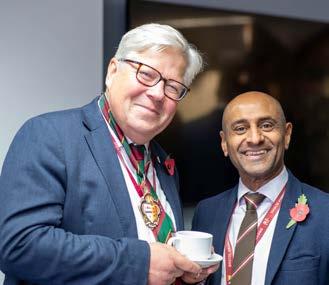
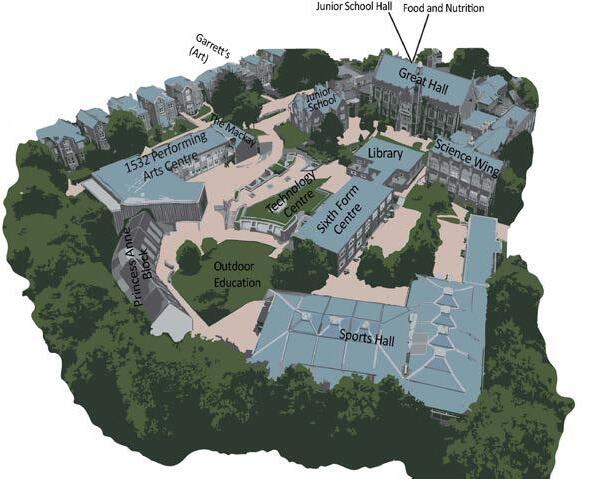
Downstairs: JCR, Sixth Form Café, Mr Harford’s Office, Mrs Hicks’ Office, Mrs Kent’s Office and Computer Science
Upstairs: Library, Careers, Pastoral support, J16, Psychology, Economics and Business Studies
Great Hall and Main School Reception. Our Student Helpdesk and Medical Centre is directly opposite Reception
Winterstoke Wing: Biology, Chemisty and Physics
University Road Building: English Literature and Language U1–U13
PE and Games: Gym, Sports Hall, Climbing Wall and Squash Courts
Princess Anne Building (PAB): Mathematics
Technology
Please
1532 Performing Arts Centre (PAC): MacKinnon Theatre, Music, Music Technology, Dance, Drama and the Mackay
Norwood’s: History
Caldicott’s: Classical Civilisation
Leighton’s: Modern and Classical Languages
Garrett’s: Fine Art
Martin’s: Politics and Philosophy
Barton’s: Geography
Coach Stop: Coaches going up to Failand
With the exception of the main entrance gates, all doors and gates around the school are kept locked during the day. Students will be given the codes at the beginning of each term.